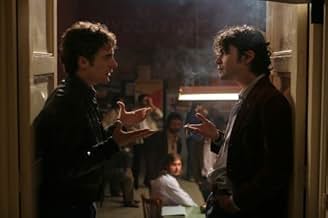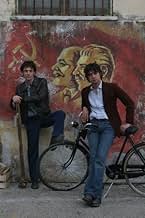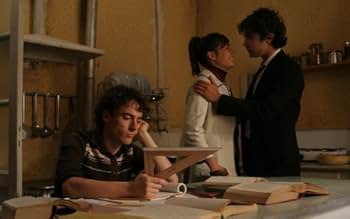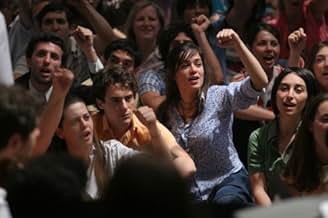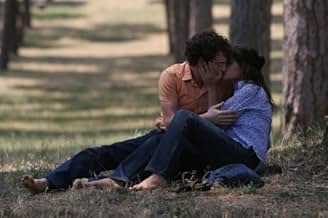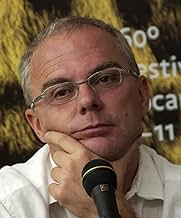IMDb रेटिंग
7.0/10
6.9 हज़ार
आपकी रेटिंग
अपनी भाषा में प्लॉट जोड़ेंTwo brothers come of age in a small Italian town in the '60s and '70s.Two brothers come of age in a small Italian town in the '60s and '70s.Two brothers come of age in a small Italian town in the '60s and '70s.
- पुरस्कार
- 19 जीत और कुल 29 नामांकन
Antonino Bruschetta
- Segretario Bombacci
- (as Ninni Bruschetta)
फ़ीचर्ड समीक्षाएं
Good Italian movies are few and far between – the last I saw was Zefferelli's "Tea with Mussolini", and before that, "Life Is Beautiful". It seems that Italian movies, good or bad, are rare. If the list in Wikipedia is anything to go by, Italy produces about ten to fifteen features a year, far less than Australia.
This one is about growing up in a post-Mussolini, post-war world as a working class Italian. The narrator, Accio (Elio Germano), bright but temperamental, is not the most pleasant of people (his name means bully). At 13 he is sent off to a seminary by his long-suffering and pious parents but even though it's a fairly humane regime he doesn't last long. So it's back to the family's tiny, crumbling flat to grow up with his older brother, Manrico (Riccardo Scarmarcio). Rejecting religion, Accio comes into the orbit of the local fascists, though he is more interested in action than ideology. The handsome, charming Manrico becomes a communist, and beds Francesca (Diane Fleri), an attractive middle class girl who has joined the comrades. Naturally Accio gets interested in Francesca as well.
The story covers the period 1962 to 1968 and plenty of reference is made to the turmoil of the times, but basically it is about a textbook case of sibling rivalry. Acco and Manrico cannot keep their hands off each other – in order to fight, that is. Acco however does manage to reach some sort of maturity at the end.
The story moves along at a good pace and there are plenty of funny scenes. The best one is the occupation by the communist students during the 1968 disturbances of the Rome conservatory where they perform Beethoven's "Ode to Joy" with the words changed to communist slogans, and are then invaded by the fascists crying "Don't mess with Beethoven" (actually the original words were from a poem by Schiller). The switch of actors (Vittorio Propizio plays the younger Accio) is accomplished in a particularly neat fashion, using a method I last saw used in "Conan the Barbarian" where the older actor is substituted in mid-scene.
In the background is Mussolini's legacy, an angry, confused and humiliated nation without a clear sense of direction. His 1930's "new towns" like Latina on the Pontine marches, jerry-built and badly designed, were crumbling already by the 1960s. Replacement housing had been built but corrupt local officials were holding up its allocation. There is a very satisfying moment at the end of the film when Accio, no stranger to causing a ruckus, takes remedial action.
Not being Italian I probably missed a lot, but the film held my attention for its full length, despite Accio not being a particularly nice lad (then neither was Genghis Khan and he had an interesting life). The film is bright, fresh and fast-moving though I'm not sure about the climax, which is rather on the melodramatic side. If the Italians can bring themselves to make more movies of this quality, I'll come along to watch.
This one is about growing up in a post-Mussolini, post-war world as a working class Italian. The narrator, Accio (Elio Germano), bright but temperamental, is not the most pleasant of people (his name means bully). At 13 he is sent off to a seminary by his long-suffering and pious parents but even though it's a fairly humane regime he doesn't last long. So it's back to the family's tiny, crumbling flat to grow up with his older brother, Manrico (Riccardo Scarmarcio). Rejecting religion, Accio comes into the orbit of the local fascists, though he is more interested in action than ideology. The handsome, charming Manrico becomes a communist, and beds Francesca (Diane Fleri), an attractive middle class girl who has joined the comrades. Naturally Accio gets interested in Francesca as well.
The story covers the period 1962 to 1968 and plenty of reference is made to the turmoil of the times, but basically it is about a textbook case of sibling rivalry. Acco and Manrico cannot keep their hands off each other – in order to fight, that is. Acco however does manage to reach some sort of maturity at the end.
The story moves along at a good pace and there are plenty of funny scenes. The best one is the occupation by the communist students during the 1968 disturbances of the Rome conservatory where they perform Beethoven's "Ode to Joy" with the words changed to communist slogans, and are then invaded by the fascists crying "Don't mess with Beethoven" (actually the original words were from a poem by Schiller). The switch of actors (Vittorio Propizio plays the younger Accio) is accomplished in a particularly neat fashion, using a method I last saw used in "Conan the Barbarian" where the older actor is substituted in mid-scene.
In the background is Mussolini's legacy, an angry, confused and humiliated nation without a clear sense of direction. His 1930's "new towns" like Latina on the Pontine marches, jerry-built and badly designed, were crumbling already by the 1960s. Replacement housing had been built but corrupt local officials were holding up its allocation. There is a very satisfying moment at the end of the film when Accio, no stranger to causing a ruckus, takes remedial action.
Not being Italian I probably missed a lot, but the film held my attention for its full length, despite Accio not being a particularly nice lad (then neither was Genghis Khan and he had an interesting life). The film is bright, fresh and fast-moving though I'm not sure about the climax, which is rather on the melodramatic side. If the Italians can bring themselves to make more movies of this quality, I'll come along to watch.
'My Brother is an Only Child' tells the story of two red-blooded siblings as they take their first steps into political and sexual adulthood in the Italy of the 1960s. It's an intriguing premise, but for me, it didn't quite come together. Specifically, the fascism and communism that its protagonists pursue seem obviously unappealing: the film fails to convey how anyone could follow such causes except out of immaturity, though there are some funny moments (the new leftist lyrics to Beethoven's Ninth Symphony the most obvious of them). At the end of the film, a housing scandal is exposed, but the film doesn't really explain how the scam had worked: the story would make sense if the houses in question hadn't actually been built, but in fact they have been, and one senses that the writer has resolved a happy ending without worrying too much about the details. What's nice about this film is its portrait of a place and a time, and the very believable love-hate relationship between the brothers; but if you weren't there yourself, perhaps its inevitable that you find yourself looking in from the outside.
Luchetti's film ('Il mio fratello è figlio unico') goes from the Sixties into the Seventies in Italy following two brothers from a communist working-class family. Accio Benano, the rebellious younger one, who drops out of seminary very quickly, gives in to the constant indoctrination of a much older bus driver pal named Mario (Luca Zingaretti) and joins the fascist party. Then he falls in love with Francesca (Diane Fleri), the girlfriend (the first of a series) of his Lothario older brother Manrico (blue-eyed dreamboat Riccardo Scamarcio). Manrico becomes a leftist leader in '68 and moves on to terrorist activities in the Seventies. Accio's black-shirt cohorts cause their share of bother too, of course, but they are depicted as both inept and betraying Accio's confidence. Eventually the latter realizes he's a leftist too at heart. (He only adopted fascism because he wanted to be contrary.) This change in Accio comes almost in time to save Manrico from big trouble.
It took me a while to adjust to the shift in actors when Accio goes from early to late teens. No doubt Elio Germano was an inevitable choice for the older Accio because of his sweet, ironic presence: he's a lovely actor. But the younger actor, Vittorio Emanuele Propizio, and the incidents Accio's involved in early on, project a spirit of fun and craziness that I missed thereafter. In fact, the promise of the early sequences gets dissipated in what becomes an increasingly plodding (and overly telescoped) series of events as Accio's and Manrico's politics, love lives, and family involvements criss-cross over the years.
Reports from those who've read Antonio Pennacchi's amusingly titled novel 'Il fasciocommunista' say the movie lightens things up, but Sandro Petraglia and Stefano Rulli, who collaborated on the screen adaptation, seem to have gotten bogged down and too literally followed the story after those light-hearted and promising beginnings. Mind you, Petraglia and Rulli are no slouches: they also scripted the recent 'Criminal Romance' (veteran actor Michele Placido's 2005 directorial debut, which also features Scamarcio) as well as the highly successful theatrically released TV miniseries 'The Best of Youth,' whose decade-sweeping plot this film's somewhat echoes.
A memorable set piece shows Manrico introducing a '68 reworking of Beethovan's 'Ode to Joy' with revolutionary lyrics. During the performance Mario's fascist hooligans move in, and their targeting his own brother leads to Accio's final break with the right.
The family's base is Latina, a town created by Mussolini south of Rome, which makes an ever-present reminder of heavy Italian legacies. Mario represents the element who refuse to erase or forget the nation's fascist past. He argues (among other things) that there's a worthwhile legacy of architecture. Indeed fascist architecture does have a certain kitsch charm one ought not reject too easily; and an inability to come to terms with the fascist past is surely one of the main reasons for Italy's muddled self-image. This story is a stab at dealing with that psychological issue in a healthy way.
'My Brother Is an Only Child,' which was rejected by the Cannes jury for Official Entry status, lacks the fluidity of Gabriele Muccino's 'Io come te nessuno mai' (which, though very different, comes to mind for its blending of coming of age, family conflict, and politics) but it has a kind of vernacular vigor. It's true, Italian cinema continues to go through a largely lackluster period, and Italian film-goers appear to have been bitterly disappointed with Luchetti's latest. That's a bit of a shame, because there is a lot of charm and humanity here, and for anyone interested in Italy and its modern history, this should be required viewing.
Seen during a limited run in Paris, October 17, 2007.
It took me a while to adjust to the shift in actors when Accio goes from early to late teens. No doubt Elio Germano was an inevitable choice for the older Accio because of his sweet, ironic presence: he's a lovely actor. But the younger actor, Vittorio Emanuele Propizio, and the incidents Accio's involved in early on, project a spirit of fun and craziness that I missed thereafter. In fact, the promise of the early sequences gets dissipated in what becomes an increasingly plodding (and overly telescoped) series of events as Accio's and Manrico's politics, love lives, and family involvements criss-cross over the years.
Reports from those who've read Antonio Pennacchi's amusingly titled novel 'Il fasciocommunista' say the movie lightens things up, but Sandro Petraglia and Stefano Rulli, who collaborated on the screen adaptation, seem to have gotten bogged down and too literally followed the story after those light-hearted and promising beginnings. Mind you, Petraglia and Rulli are no slouches: they also scripted the recent 'Criminal Romance' (veteran actor Michele Placido's 2005 directorial debut, which also features Scamarcio) as well as the highly successful theatrically released TV miniseries 'The Best of Youth,' whose decade-sweeping plot this film's somewhat echoes.
A memorable set piece shows Manrico introducing a '68 reworking of Beethovan's 'Ode to Joy' with revolutionary lyrics. During the performance Mario's fascist hooligans move in, and their targeting his own brother leads to Accio's final break with the right.
The family's base is Latina, a town created by Mussolini south of Rome, which makes an ever-present reminder of heavy Italian legacies. Mario represents the element who refuse to erase or forget the nation's fascist past. He argues (among other things) that there's a worthwhile legacy of architecture. Indeed fascist architecture does have a certain kitsch charm one ought not reject too easily; and an inability to come to terms with the fascist past is surely one of the main reasons for Italy's muddled self-image. This story is a stab at dealing with that psychological issue in a healthy way.
'My Brother Is an Only Child,' which was rejected by the Cannes jury for Official Entry status, lacks the fluidity of Gabriele Muccino's 'Io come te nessuno mai' (which, though very different, comes to mind for its blending of coming of age, family conflict, and politics) but it has a kind of vernacular vigor. It's true, Italian cinema continues to go through a largely lackluster period, and Italian film-goers appear to have been bitterly disappointed with Luchetti's latest. That's a bit of a shame, because there is a lot of charm and humanity here, and for anyone interested in Italy and its modern history, this should be required viewing.
Seen during a limited run in Paris, October 17, 2007.
There's this much to be said for this movie from the ranks of Italy's new young directors and actors: The quality of the acting was at least one notch above the usual fare, which almost never transcends the clichéd facial expressions and intonations we expect to find in TV dramas and sit-coms. This new generation of actors and directors was raised on US television imports ("telefilms") and Latin-American soaps, and it definitely shows in the uninspired and uninspiring quality of their work. And one gets the impression that 90% of them come from Parioli, a very well-to-do neighborhood of Rome, that would be the rough equivalent of coming from Santa Monica, Lake Forest IL, or Westport Conn—all those perfectly groomed faces coming from families of the Italian haute bourgeoisie with unlimited funds to advance their children's "acting career." If it weren't for Elio Germano as Accio (as well as Luca Zingaretti as Accio's fascist mentor and Anna Bonaiuto as his wife), this movie would probably fall into the same category of banalized film-making with all the rest.
But Germano's performance is not enough to salvage a film that fails to rise above a rating of "mediocrity +". Certainly it was an interesting idea to situate the action in Latina, a city built from scratch by Mussolini's fascist regime after it had drained the surrounding swamp land (the "bonifica" that was one of Fascism's highly touted achievements). All of the city's architecture was inspired by fascist "monumental" design.
Regrettably, Luchetti has done little of interest to exploit this setting for his family drama other than to bring up the same old cliché of opposing extremisms (the thuggery of the neo-fascist right vs. the banditry and targeted terrorism of the extra-parliamentary left). And the drama of the conflict between these two extremisms is used altogether too much to drive the plot forward. Some Italian commentators disliked this film because it seemed to go over the same old ground in the same old way—when it was time, presumably, to move on to new subjects. But the problem was not that it rehashed Italian history—the problem was the "hash." Bellocchio, after all, did a wonderful job of re-interpreting to Italians the experience of the Red Brigades in his "Buongiorno,Notte".
But here the audience is simply given a choice between fascist hooliganism and a lunatic left, when actually the situation in Italy in the 60s and 70s was much more complicated and nuanced. Millions of Italians belonged to parties and movements that were seriously committed to a progressive transformation of Italy that did not involve knee-cappings and assassinations. And so Luchetti ends up confirming (perhaps despite himself) the American/Berlusconiano vision of the world: "Forget about ideology—it's all about individual freedom and authenticity in your personal relationships." And finally we can see the effects of Berlusconi's TV stations and their ilk also in the movie's script. After 20, I stopped counting how many times the characters said, "Ma Che Cazzo Dici?"("What the f#%k are you saying?"). It is a measure of the moronization of the Italian public under the sway of Berlusconi and Berlusconian media that the scriptwriters think that they can get a laugh out of an Italian audience with this phrase each and every time it is said—and sadly they're probably right.
But Germano's performance is not enough to salvage a film that fails to rise above a rating of "mediocrity +". Certainly it was an interesting idea to situate the action in Latina, a city built from scratch by Mussolini's fascist regime after it had drained the surrounding swamp land (the "bonifica" that was one of Fascism's highly touted achievements). All of the city's architecture was inspired by fascist "monumental" design.
Regrettably, Luchetti has done little of interest to exploit this setting for his family drama other than to bring up the same old cliché of opposing extremisms (the thuggery of the neo-fascist right vs. the banditry and targeted terrorism of the extra-parliamentary left). And the drama of the conflict between these two extremisms is used altogether too much to drive the plot forward. Some Italian commentators disliked this film because it seemed to go over the same old ground in the same old way—when it was time, presumably, to move on to new subjects. But the problem was not that it rehashed Italian history—the problem was the "hash." Bellocchio, after all, did a wonderful job of re-interpreting to Italians the experience of the Red Brigades in his "Buongiorno,Notte".
But here the audience is simply given a choice between fascist hooliganism and a lunatic left, when actually the situation in Italy in the 60s and 70s was much more complicated and nuanced. Millions of Italians belonged to parties and movements that were seriously committed to a progressive transformation of Italy that did not involve knee-cappings and assassinations. And so Luchetti ends up confirming (perhaps despite himself) the American/Berlusconiano vision of the world: "Forget about ideology—it's all about individual freedom and authenticity in your personal relationships." And finally we can see the effects of Berlusconi's TV stations and their ilk also in the movie's script. After 20, I stopped counting how many times the characters said, "Ma Che Cazzo Dici?"("What the f#%k are you saying?"). It is a measure of the moronization of the Italian public under the sway of Berlusconi and Berlusconian media that the scriptwriters think that they can get a laugh out of an Italian audience with this phrase each and every time it is said—and sadly they're probably right.
The political backdrop of this 60s character drama is both nostalgic and frightening - that disaffected and rebellious Accio finds himself so easily taken in by a Fascist mentor strikes parallels with the our own young men turning to extremism or street violence in a search of identity. Accio clashes dramatically with his older brother, the hip, good-looking communist, but the story not so much about political ideals as their expression of familial jealousies and personal moral development.
The tensions and affections of this struggling working class family, portrayed by all with genuine emotion. The dialogue is witty and charming and not unlike other memorable Italian films (Il Postino, Cinema Paradiso) the characters come across almost too resoundingly. This gives the film a well-crafted theatrical quality, that is engaging, well-paced and very satisfying.
The tensions and affections of this struggling working class family, portrayed by all with genuine emotion. The dialogue is witty and charming and not unlike other memorable Italian films (Il Postino, Cinema Paradiso) the characters come across almost too resoundingly. This gives the film a well-crafted theatrical quality, that is engaging, well-paced and very satisfying.
क्या आपको पता है
- ट्रिवियाTaken from the novel "Il fasciocomunista", the title has been changed in "Mio fratello è figlio unico" as a tribute to the eponymous song by Rino Gaetano.
- साउंडट्रैकSul mio carro (Chariot)
Performed by Sonia Cruceru
टॉप पसंद
रेटिंग देने के लिए साइन-इन करें और वैयक्तिकृत सुझावों के लिए वॉचलिस्ट करें
- How long is My Brother Is an Only Child?Alexa द्वारा संचालित
विवरण
- रिलीज़ की तारीख़
- कंट्री ऑफ़ ओरिजिन
- आधिकारिक साइटें
- भाषा
- इस रूप में भी जाना जाता है
- My Brother Is an Only Child
- फ़िल्माने की जगहें
- उत्पादन कंपनियां
- IMDbPro पर और कंपनी क्रेडिट देखें
बॉक्स ऑफ़िस
- बजट
- €50,00,000(अनुमानित)
- US और कनाडा में सकल
- $2,55,620
- US और कनाडा में पहले सप्ताह में कुल कमाई
- $9,357
- 30 मार्च 2008
- दुनिया भर में सकल
- $1,28,94,062
- चलने की अवधि1 घंटा 48 मिनट
- रंग
- ध्वनि मिश्रण
- पक्ष अनुपात
- 1.85 : 1
इस पेज में योगदान दें
किसी बदलाव का सुझाव दें या अनुपलब्ध कॉन्टेंट जोड़ें

टॉप गैप
By what name was Mio fratello è figlio unico (2007) officially released in India in English?
जवाब





